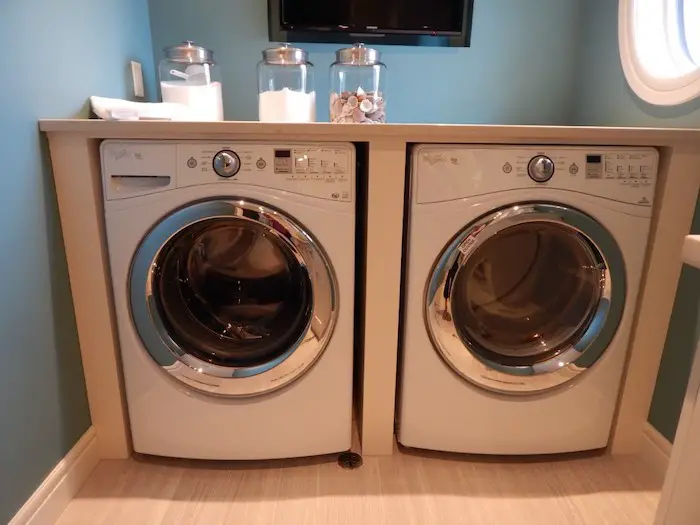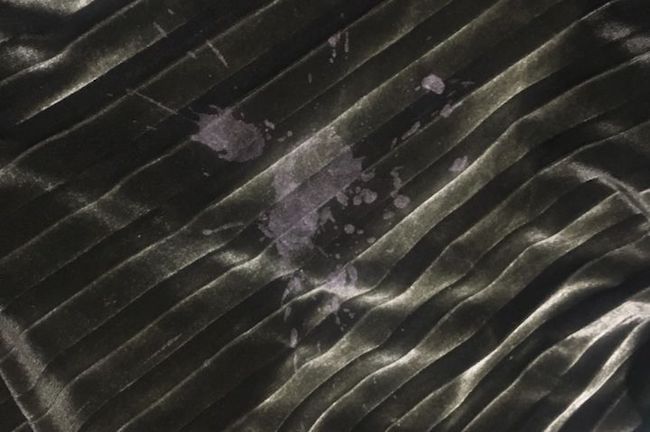With so many appliances and tools in our homes these days, it can get a little overwhelming. Many times, it seems like our appliances have similar capabilities. So, it would seem like using one appliance for several different tasks would be more efficient than having one machine for each task. This brings us to the household dishwasher. Many homes will have one of these appliances, and maybe you found yourself thinking:
Can you use a dishwasher as a washing machine? No. You should not put clothing in a dishwasher. The dishwasher could damage your clothing, and your clothing could damage your expensive dishwasher. Dishwashers are also not very good at getting clothing clean because they do not agitate anything inside.
Dishwashers and washing machines may seem very much the same, but don’t be fooled! There are lots of differences in form and function that make them separate and individually useful in everyday life.
Could You Use a Dishwasher To Wash Clothes?
It’s tempting, we know. Tossing your dirty clothes in the dishwasher to save time seems like a great idea. But please don’t. You should never wash your clothes or any fabrics inside a dishwasher. This is due to many facts, not the least of which is that dishwashers do not agitate or move things around inside the unit while it runs. This kind of movement would break the dishes or cause other damage.
As no agitation occurs inside a dishwasher, your clothing will not actually get washed, just wet and possibly ruined.
The detergent you use on clothing is also quite different than what is used on dishes in a dishwasher. Using the dishwasher to wash your clothes may actually make your clothing much dirtier! You’ll just get your clothing covered in food bits and smelly water.
Differences Between Dishwashers and Washing Machines
You should never wash your clothes in a dishwasher. Dishwashers and washing machines each serve a vital function in your home. These machines are vastly different, and there is a long list of reasons why you shouldn’t wash clothes in a dishwasher. Below are some of the most significant points.
Water temperature
A typical dishwasher cannot have the temperature of water changed. It is usually around 120 to 180 degrees Fahrenheit, which is hot enough to sanitize dishes and utensils. This temperature is not ideal for most types of cloth. This high temperature can cause shrinkage of the garments. In same cases, it could even melt or warp your clothing.
Not only will it damage your clothes, but it can actually lead to unusual wear and tear on your dishwasher. All those loose threads, lint, and body soil coming out with that hot water can clog and destroy your dishwasher!
Soaps and Detergents
This article here explains in detail the differences between the types of soaps used in washing machines and dishwashers. Simply put, the two detergents used in dishwashers and washing machines were designed to work with the specific properties of each machine.
One machine agitates the things inside, causing suds and free-flowing cleaners. The other is designed to keep the contents stationary and avoid bubbles. Besides the mechanical properties (moving versus not moving), there’s the worry of chemicals cross-contaminating clothing and dishes—yuck!
What do we mean by that? You really should not mix your laundry detergent into your dishwasher. The chemicals could leave residue that may end up causing irritations or making you sick when you do a load of dishes after doing laundry. The chemicals in each type of soap are also quite specific to their required task, and should never be substituted for something else.
See Also:
Is it okay to Use Laundry Detergent To Wash Dishes?
Is it okay to Pour Liquid Detergent Directly On Clothes
Dye From Clothing
Believe it or not, the dye from clothes could possibly remain inside the dishwasher after its cycle is complete. This dye could end up on your dishes. While this won’t normally hurt you in small amounts, it could make you sick over time or ruin your dishes and dishwasher.
The Fabric
The fabric itself can cause some major problems inside your dishwasher!
While not all dishwashers have the spinning parts inside, there is still a possible issue that your clothes my get tangled up in the machine. The weight of the sodden fabric could also have a chance of breaking something inside the unit. These machines weren’t meant to hold heavy, wet fabrics. And any stray hairs or strings that come off in the machine could get stuck in the drains or vents, which could cause the dishwasher to break.
See Also: 14 Tips to Boost Your Dishwasher
How Do Dishwashers Work?
To understand why you should never wash your clothes in a dishwasher, it’s important to know how they work. The pitfalls should become pretty clear!
Inside, most dishwashers generally have two levels. These are divided by two pull-out racks for storing dishes in the top and bottom. There is usually a large, spinning, propeller-like device in the center top or bottom of the unit.
Already, we can see some issues for washing your clothes in a dishwasher, and we haven’t even turned it on yet! The weight of your clothes is likely to warm, bend, or break the racks. These racks are also not designed to hold clothing, so it would all be bunched up and prevent the water from reaching every part.
What Happens In a Dishwasher?
After rinsing and getting large food chunks off your dishes, you are supposed to place them in the dishwasher, load the soap, then start it up. But what actually goes on in there? Once started, the unit will begin spraying hot water over all the dishes inside. Remember that the water is moving in the dishwasher, but the dishes are always stationary. The spinning parts begin moving and splashing water everywhere, but the dishes never move.
The dishwasher sprays water in one direction, stops, then goes the other way. All this water will eventually activate the soap you added, be it a pod or liquid dishwasher soap. This process is repeated over and over. If your unit is higher end then it may have a drying function, which just turns up the heat inside and dries the dishes using heat and steam.
This does of course vary depending on the age, style and brand of dishwasher you have. If you’re curious to see what happens in one type of dishwasher, here is a short video and some funky music!
Stationary clothing won’t have a chance to move or get thoroughly cleaned if there’s just water spraying on it. If you’ve ever tried to wipe something off of your shirt, you know that agitation is key—you have to move the fabric around to get all the stains out… and a dishwasher can’t do that!
Water Used In The Dishwasher
Depending on the age and brand of your dishwasher the amount of water it pulls will be different. Modern units can use about 3 gallons of water each time they are run. An older unit may pull around 9 to 14 gallons of water!
And while all of this sounds tempting, remember that this water is super-heated and sprayed around the inside of the dishwasher. This amount of water will not clean your clothes as well as an actual washing machine would. And, as you’ve learned, the clothing itself needs to move to get clean, not just the water.
Conclusion
While a dishwasher may use less water than the washing machine, and therefore seem like an economical and eco-friendly alternative, it is ill-suited to the task of cleaning clothing. Dye from clothing and fabrics could stain the unit or leave residues that would be unpleasant or dangerous to consume. The soaps used in washing machines and dishwashers are different and not interchangeable. Dishwashers also do not agitate whatever is placed inside, so this lack of movement will leave your clothing and fabrics soapy and soaked, not clean.
Related Questions
Is the plumbing for a dishwasher the same as a washing machine?
Dishwashers are usually connected to cold water hookups; this can vary however. Washing machines will typically need a cold and hot connection.
Can you install a dishwasher yourself?
Yes, many dishwashers come with instructions on how to install the unit. They require few tools and many models have online video instructions.
No, unless the dishwasher is a portable countertop unit with a sturdy shelf under it. The same is in reverse, washing machines are very heavy and hold lots of water and clothing and may move a lot during the wash cycle, it is not recommended to place washing machines over dishwashers.
See Also:
Is it okay to Put A Sink Mat In The Dishwasher?
Is it okay to Use Dishwasher Pods For Laundry








